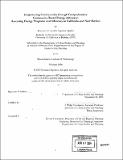Empowering communities through comprehensive community-based energy advocacy : assessing energy programs and advocacy in California and New Mexico
Author(s)
Figueroa Aguilar, Roxanne de Lourdes, 1973-
DownloadFull printable version (14.44Mb)
Other Contributors
Massachusetts Institute of Technology. Dept. of Urban Studies and Planning.
Advisor
J. Philip Thompson.
Terms of use
Metadata
Show full item recordAbstract
While energy permeates virtually all facets of our lives, from our pocketbooks to our health, issues regarding energy fail to garner widespread attention until price surges or blackouts impede everyday activities. With higher energy burdens and higher incidences of power plants in their neighborhoods, however, low-income and Latino/communities of color confront significant economic and environmental energy-related challenges on a daily basis. Energy policies not only impact the prices and provision of energy, but also affect the environmental, economic and physical well-being of communities. Sustainable energy policies that embrace renewable energy sources, energy-efficiency and conservation, and low-income energy programs, in conjunction with reliability and affordability issues, can significantly mitigate the environmental and economic energy burdens confronting low-income and communities of color, as well as the community at-large. Yet, community advocates concerned with issues such as sustainable development, housing, health, environmental justice, and economic development, to name but a few, often leave energy policy to the 'experts,' including utilities and regulators, which tend to overlook these issues, particularly with respect to low-income and communities of color. (cont.) As a result, each state provides varying levels of energy efficiency and low-income energy assistance programs, leaving some communities out in the cold. This thesis explores the energy-related challenges confronting low-income and Latino communities in California and New Mexico. Through the analysis of two contrasting environmental and low-income energy programs and advocacy approaches in California and New Mexico, the goal of this thesis is to challenge the community 'laissez faire' approach to energy policy and highlight the vital role of comprehensive community-based energy advocacy.
Description
Thesis (M.C.P.)--Massachusetts Institute of Technology, Dept. of Urban Studies and Planning, February 2004. Includes bibliographical references (p. 74-77).
Date issued
2004Department
Massachusetts Institute of Technology. Department of Urban Studies and PlanningPublisher
Massachusetts Institute of Technology
Keywords
Urban Studies and Planning.